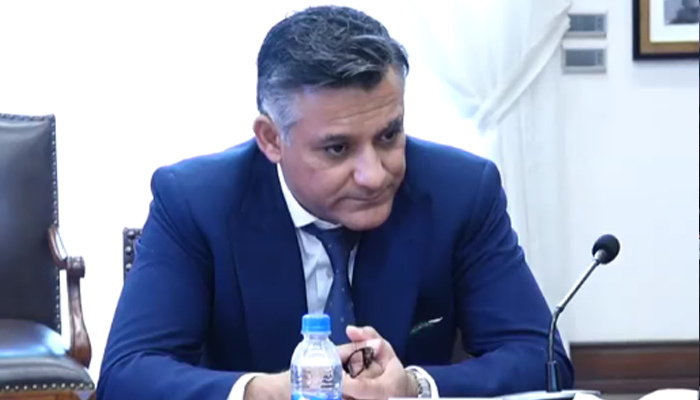‘Excavation lab on Hub River Road to be inaugurated on January 25’
The interim minister said that the seminar and conference has been organised for the new generation so that they can learn about their heritage and past
Sindh caretaker culture, antiquities & archives minister Junaid Ali Shah on Saturday said the provincial administration has constructed an excavation laboratory at Hub River Road that would be inaugurated on January 25.
Shah was addressing a conference on the Indus civilisation organised at the National Museum of Pakistan by the Sindh Culture, Tourism, Antiquities & Archives Department’s Directorate General of Antiquities & Archaeology, and the Sindh Exploration & Adventure Society Pakistan.
The interim minister said that the seminar and conference has been organised for the new generation so that they can learn about their heritage and past.
“All around the world tourism is linked with heritage and past, so we also want people from other countries to visit Pakistan to see our heritage and ancient civilisation,” he said. He vowed that all the lost antiquities of Sindh’s ancient civilisation would be brought back to the province.
Archaeologists and anthropologists working on ancient civilisations stressed on the occasion the importance of using new technology and measures to preserve laboratories, human resources and sites for researching the effects of the Sindhu Valley and the associated cultures.
Antiquities Sindh Director General Mansoor Ahmed Qazi, Dr Kaleemullah Lashari, Prof Dr Jonathan Mark Kenoyer, Marina Bukhari from Italy, Dr Sarfaraz Solangi, Dr Asma Ibrahim, Dr Joseph Schindler from the US, Zafar Iqbal from the Hazara University and various other experts presented their research. A large number of researchers and students are participating in the conference.
The caretaker minister said that the culture of the Sindhu Valley is like the mother of all cultures, and efforts are under way by the provincial government to research various projects related to the culture of the Indus Valley.
He expressed happiness over the archaeological laboratory nearing completion at Mohenjo Daro, indicating that valuable artefacts used to be sent to Italy, France or other countries for research purposes. “Now research on artefacts can be conducted at local level.”
He stressed the importance of mapping the Sindhu River to understand the Indus Valley further. This mapping, he said, would be published in document form, aiding in comprehending the connected routes from the Indus Valley.
He highlighted the impact of floods on archaeological sites, and suggested considering seasonal effects on historical sites in future projects.
Dr Lashari addressed the dangers posed by the rising water levels of Mohenjo Daro, and emphasised the need for taking measures to safeguard historical sites from the effects of increasing groundwater and saltwater levels.
The conference also shed light on the evidence from Mohenjo Daro that indicates that the items were crafted locally and traded for commerce in other regions.
Contributions from international researchers, such as findings related to the Daro Darling Core from the Dravya Core of Mohenjo Daro by Dr Schindler, emphasised the importance of taking steps to prevent risks to many artefacts from Balochistan.
DG Qazi expressed gratitude to the researchers and affirmed the commitment of the antiquities department to collaborate in furthering knowledge in the light of research recommendations.
-
 Prince William Questions Himself ‘what’s The Point’ After Saudi Trip
Prince William Questions Himself ‘what’s The Point’ After Saudi Trip -
 James Van Der Beek's Friends Helped Fund Ranch Purchase Before His Death At 48
James Van Der Beek's Friends Helped Fund Ranch Purchase Before His Death At 48 -
 King Charles ‘very Much’ Wants Andrew To Testify At US Congress
King Charles ‘very Much’ Wants Andrew To Testify At US Congress -
 Rosie O’Donnell Secretly Returned To US To Test Safety
Rosie O’Donnell Secretly Returned To US To Test Safety -
 Meghan Markle, Prince Harry Spotted On Date Night On Valentine’s Day
Meghan Markle, Prince Harry Spotted On Date Night On Valentine’s Day -
 King Charles Butler Spills Valentine’s Day Dinner Blunders
King Charles Butler Spills Valentine’s Day Dinner Blunders -
 Brooklyn Beckham Hits Back At Gordon Ramsay With Subtle Move Over Remark On His Personal Life
Brooklyn Beckham Hits Back At Gordon Ramsay With Subtle Move Over Remark On His Personal Life -
 Meghan Markle Showcases Princess Lilibet Face On Valentine’s Day
Meghan Markle Showcases Princess Lilibet Face On Valentine’s Day -
 Harry Styles Opens Up About Isolation After One Direction Split
Harry Styles Opens Up About Isolation After One Direction Split -
 Shamed Andrew Was ‘face To Face’ With Epstein Files, Mocked For Lying
Shamed Andrew Was ‘face To Face’ With Epstein Files, Mocked For Lying -
 Kanye West Projected To Explode Music Charts With 'Bully' After He Apologized Over Antisemitism
Kanye West Projected To Explode Music Charts With 'Bully' After He Apologized Over Antisemitism -
 Leighton Meester Reflects On How Valentine’s Day Feels Like Now
Leighton Meester Reflects On How Valentine’s Day Feels Like Now -
 Sarah Ferguson ‘won’t Let Go Without A Fight’ After Royal Exile
Sarah Ferguson ‘won’t Let Go Without A Fight’ After Royal Exile -
 Adam Sandler Makes Brutal Confession: 'I Do Not Love Comedy First'
Adam Sandler Makes Brutal Confession: 'I Do Not Love Comedy First' -
 'Harry Potter' Star Rupert Grint Shares Where He Stands Politically
'Harry Potter' Star Rupert Grint Shares Where He Stands Politically -
 Drama Outside Nancy Guthrie's Home Unfolds Described As 'circus'
Drama Outside Nancy Guthrie's Home Unfolds Described As 'circus'




